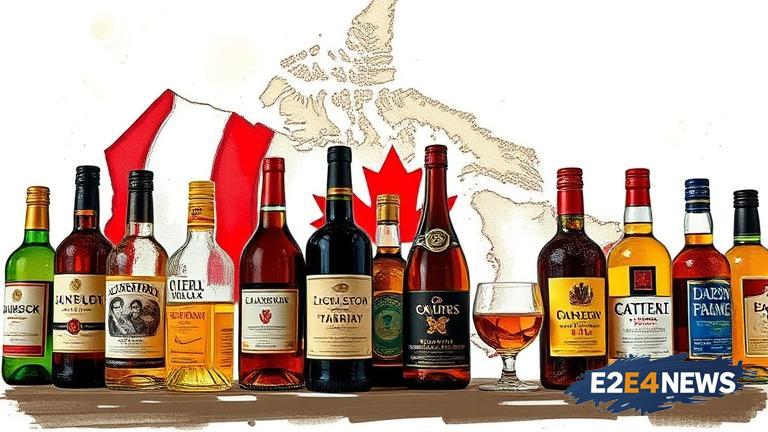The US-Canada tariff dispute has been ongoing for several months, with both countries imposing tariffs on various goods, including liquor. As a result, US liquor sales in Canada have plummeted, with many Canadian drinkers choosing to boycott American products. The decline in sales has been particularly noticeable in the whiskey and bourbon sectors, with sales of US-made whiskey down by as much as 20% in some provinces. Canadian drinkers are instead opting for domestic or European alternatives, such as Canadian whiskey or Scotch. The tariff dispute has also led to an increase in prices for US liquor in Canada, making it even less competitive with domestic and European products. Many Canadian retailers have reported a significant decline in sales of US liquor, with some even choosing to stop carrying certain products altogether. The decline in US liquor sales has also had a negative impact on the Canadian hospitality industry, with many bars and restaurants reporting a decline in sales of US-made cocktails. Despite the decline in sales, some US liquor producers are still optimistic about the Canadian market, citing the country’s strong economy and growing demand for premium spirits. However, others are more pessimistic, citing the ongoing tariff dispute and the rise of protectionism in Canada. The Canadian government has imposed tariffs on US goods, including liquor, in retaliation for US tariffs on Canadian steel and aluminum. The US has also imposed tariffs on Canadian whiskey, which has had a negative impact on Canadian exports. The tariff dispute has also led to a decline in US wine sales in Canada, with many Canadian drinkers opting for domestic or European alternatives. The decline in US wine sales has been particularly noticeable in the premium wine sector, with sales of US-made premium wine down by as much as 30% in some provinces. Canadian drinkers are instead opting for domestic or European alternatives, such as Canadian wine or French wine. The tariff dispute has also led to an increase in prices for US wine in Canada, making it even less competitive with domestic and European products. Many Canadian retailers have reported a significant decline in sales of US wine, with some even choosing to stop carrying certain products altogether. The decline in US wine sales has also had a negative impact on the Canadian hospitality industry, with many bars and restaurants reporting a decline in sales of US-made wine. Despite the decline in sales, some US wine producers are still optimistic about the Canadian market, citing the country’s strong economy and growing demand for premium wine. However, others are more pessimistic, citing the ongoing tariff dispute and the rise of protectionism in Canada. The Canadian government has imposed tariffs on US goods, including wine, in retaliation for US tariffs on Canadian steel and aluminum. The US has also imposed tariffs on Canadian wine, which has had a negative impact on Canadian exports. The tariff dispute has also led to a decline in US spirits sales in Canada, with many Canadian drinkers opting for domestic or European alternatives. The decline in US spirits sales has been particularly noticeable in the premium spirits sector, with sales of US-made premium spirits down by as much as 25% in some provinces. Canadian drinkers are instead opting for domestic or European alternatives, such as Canadian spirits or European spirits.
